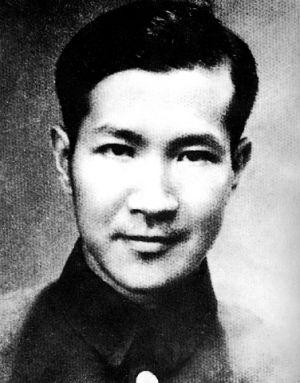Difference between revisions of "Xian Xinghai"
imported>Ciic |
imported>Ciic |
||
| Line 1: | Line 1: | ||
| + | [[File:Xian Xinghai.jpg|thumb|300px|Xian Xinghai]] | ||
'''Xian Xinghai''', a musician from [[Panyu]], [[Guangdong Province]], once studied in the Paris Conservatory of France. He returned to [[China]] in 1935. During the Chinese war of resistance against Japan, he wrote vocal works that encouraged people to fight the invaders. In 1938, he became dean of the Music Department at the Lu Xun Institute of Arts in [[Yan'an]]. Then, in 1939, he joined the [[Communist Party of China]] and went to the Soviet Union for an inspection tour in 1940. | '''Xian Xinghai''', a musician from [[Panyu]], [[Guangdong Province]], once studied in the Paris Conservatory of France. He returned to [[China]] in 1935. During the Chinese war of resistance against Japan, he wrote vocal works that encouraged people to fight the invaders. In 1938, he became dean of the Music Department at the Lu Xun Institute of Arts in [[Yan'an]]. Then, in 1939, he joined the [[Communist Party of China]] and went to the Soviet Union for an inspection tour in 1940. | ||
| Line 6: | Line 7: | ||
[[category:people]] | [[category:people]] | ||
| − | |||
Latest revision as of 08:33, 30 October 2013
Xian Xinghai, a musician from Panyu, Guangdong Province, once studied in the Paris Conservatory of France. He returned to China in 1935. During the Chinese war of resistance against Japan, he wrote vocal works that encouraged people to fight the invaders. In 1938, he became dean of the Music Department at the Lu Xun Institute of Arts in Yan'an. Then, in 1939, he joined the Communist Party of China and went to the Soviet Union for an inspection tour in 1940.
Xian composed many works, including On Taihang Mountain, Guerrilla Song, Salvation Song, Go to the Homefront of the Enemy, We Are Pioneers, and The Vast Siberia. Yellow River Cantata, Labor Cantata, National Liberation Symphony, and Holy War are among his masterpieces. He also created orchestral pieces like Chinese Rhapsody and Man Jiang Hong.
Xian died on October 30, 1945 in Moscow at the age of 40.
